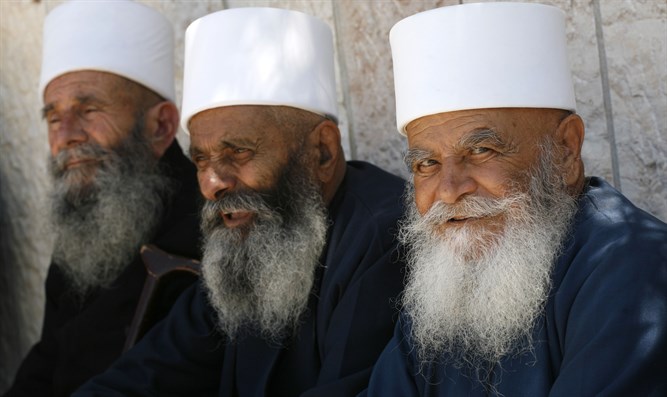Australia/Israel Review
Scribblings: Busting the UN’s Zombie Resolutions
Sep 1, 2016 | Tzvi Fleischer

Tzvi Fleischer
As readers are probably aware, UN bodies, especially the General Assembly, have a habit of passing the same anti-Israel resolutions every year, regardless of changing circumstances. Sometimes new resolutions are added to the annual package, or new clauses to existing ones, but the old resolutions are essentially immortal – renewed every year, apparently for eternity.
How kneejerk and ridiculous this has become has been particularly apparent in recent years in the wake of the Syrian civil war. As the state of Syria fell apart, as a majority of the Syrian population were displaced from their homes, as close to half a million Syrians are estimated to have been killed, the UN still passed annual resolutions condemning Israeli control over the Golan Heights. For instance, Resolution 70/91 demands Israel “desist” from its supposed “repressive measures against the population of the occupied Syrian Golan” and also demanded Israel not give residents of the Golan either Israeli citizenship or identity cards, presumably so they can be returned to Syria.
But the actual residents of the Golan in whose name this resolution was passed, approximately 20,000 Druze villagers, appear to largely disagree. After maintaining a careful distance from Israel for decades since 1967 out of loyalty to the Syrian regime, they now know they are far better off out of the Syrian situation. There has been a sharp uptick in applications for Israeli citizenship, and some are now speaking out against the UN’s attempt to essentially demand Israel restore them to a Syrian sovereignty that no longer exists.
Thus, Dulan abu-Saleh, the Mayor of Majdal Shams, the largest Druze town in the Golan, reacted harshly to a resolution passed in late July by the United Nations Economic and Social Council condemning Israel for the “economic and social repercussions of the occupation on the living conditions of the Palestinian people in the occupied Palestinian territories… and the Arab population in the occupied Syrian Golan.”
Speaking to Israeli media, he called the resolution a “total joke” with regard to the Golan and added:
“I don’t understand what they’re talking about, it’s laughable…. [Golan Druze] don’t serve in the IDF and so far are only receiving from the state. Although we weren’t included in some major cabinet decisions on budgets, when we build and make up plans we never felt discrimination… Why don’t they condemn the horrors in Syria, where dozens of children are killed daily? Golan residents have a good life.”
Other residents have publicly said some similar things.
But don’t expect the UN to respect their wishes – the zombie UN resolutions demanding Israel send these people back to the Syrian civil war, or at least prevent them from becoming Israeli even if they want to, will surely continue.
As abu-Saleh’s comments should make clear, UN resolutions on the Middle East are not mainly about looking at facts and trying to make things better. They are about political point-scoring based on the raw numbers of Arab and Muslim states, and their political allies in the Non-Aligned Movement. So the Zombie UN resolutions will march on.
Bridge Game
Israel controls the borders of “Palestine”, right? Not only does Israel implement a blockade on Gaza, controlling who and what can enter and leave (if you arbitrarily leave the Egyptian border, which Israel does not control, out of the picture), it also controls the main exit out of the West Bank for Palestinians, the Allenby Bridge into Jordan, right?
Actually, the picture is more complicated than that. Yes, Israel does have a military presence on the bridge and can in principle regulate traffic across it. But most people would be surprised to learn that so does the Palestinian Authority (PA) – and prima facie, it seems the PA presence likely does more to regulate this traffic than Israeli forces.
Numbers alone show Israeli control of Allenby is hardly oppressive. An average of 1.7 million people have crossed the Allenby Bridge annually in either direction in recent years, according to Israeli figures. That number is about equal to the entire population of the West Bank.
Meanwhile, official PA statistics show that Palestinian Authority police are doing a great deal to control the flow of people. For instance, in 2011, according to the Palestinian Maan news agency, Palestinian passport police prevented 4,653 passengers from travelling across the bridge for security reasons, and arrested 1,522 others at the bridge terminal on various charges. That’s more than 12 refusals and four arrests per day, on average.
This illustrates something I’ve tried to explain before but bears repeating – contrary to the popular perception, most Palestinians in both the West Bank and Gaza have no reason to encounter Israeli soldiers or authorities on a regular basis. The West Bank’s cities and large towns, where more than 90% of the Palestinian population live, are in Area A, completely under PA control. Moreover, while this wasn’t the case a few years ago, it is today generally possible for Palestinians to travel between West Bank cities – though not into east Jerusalem or Israel – without having to pass through an Israeli checkpoint.
West Bank Palestinians may encounter IDF soldiers during Israeli night raids into Palestinian towns to arrest terror suspects, or at temporary checkpoints in response to specific security incidents or threats – but both could be avoided almost completely if the PA would do more to reduce incitement and crack down more effectively on anti-Israel terror emanating from Area A.
Now obviously, a genuine two-state resolution would be vastly preferable to the current arrangements. However, until that is possible, it is neither honest nor helpful to the cause of peace to eliminate this complex reality and reduce the current situation to a cartoon vision of “occupation” involving domineering soldiers totally controlling the daily lives of innocent Palestinians victims, as too many seem determined to do.
Tags: Israel






